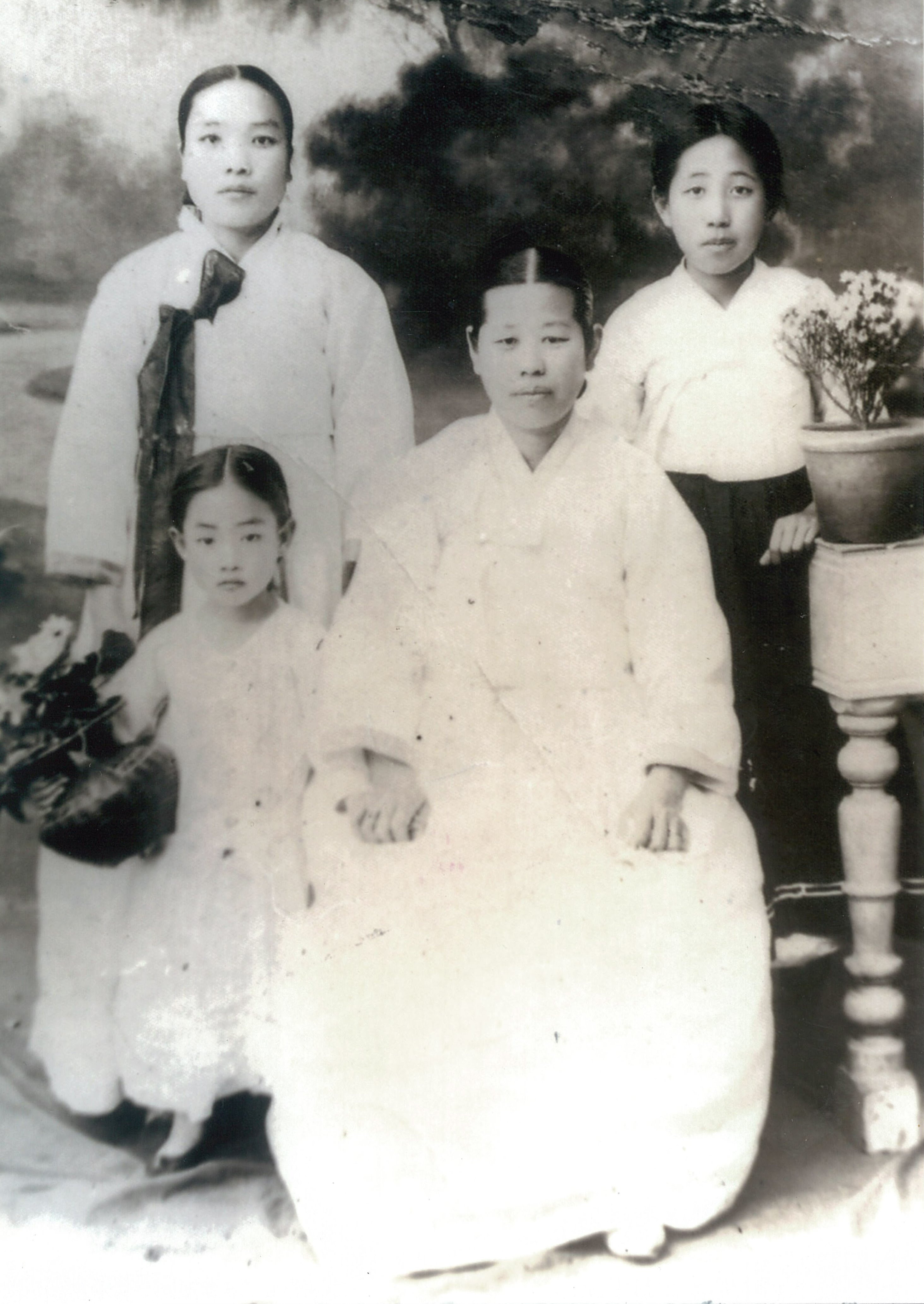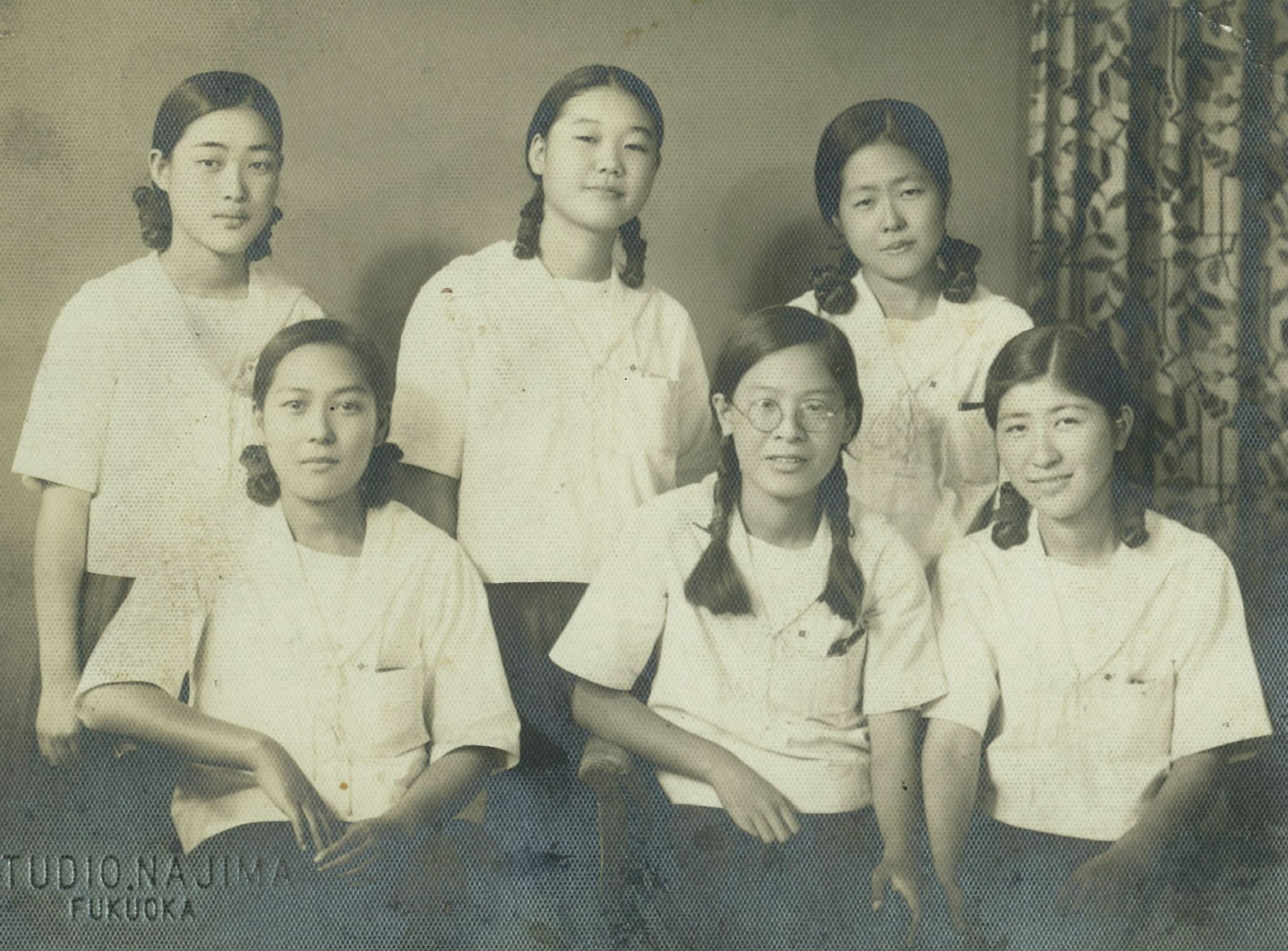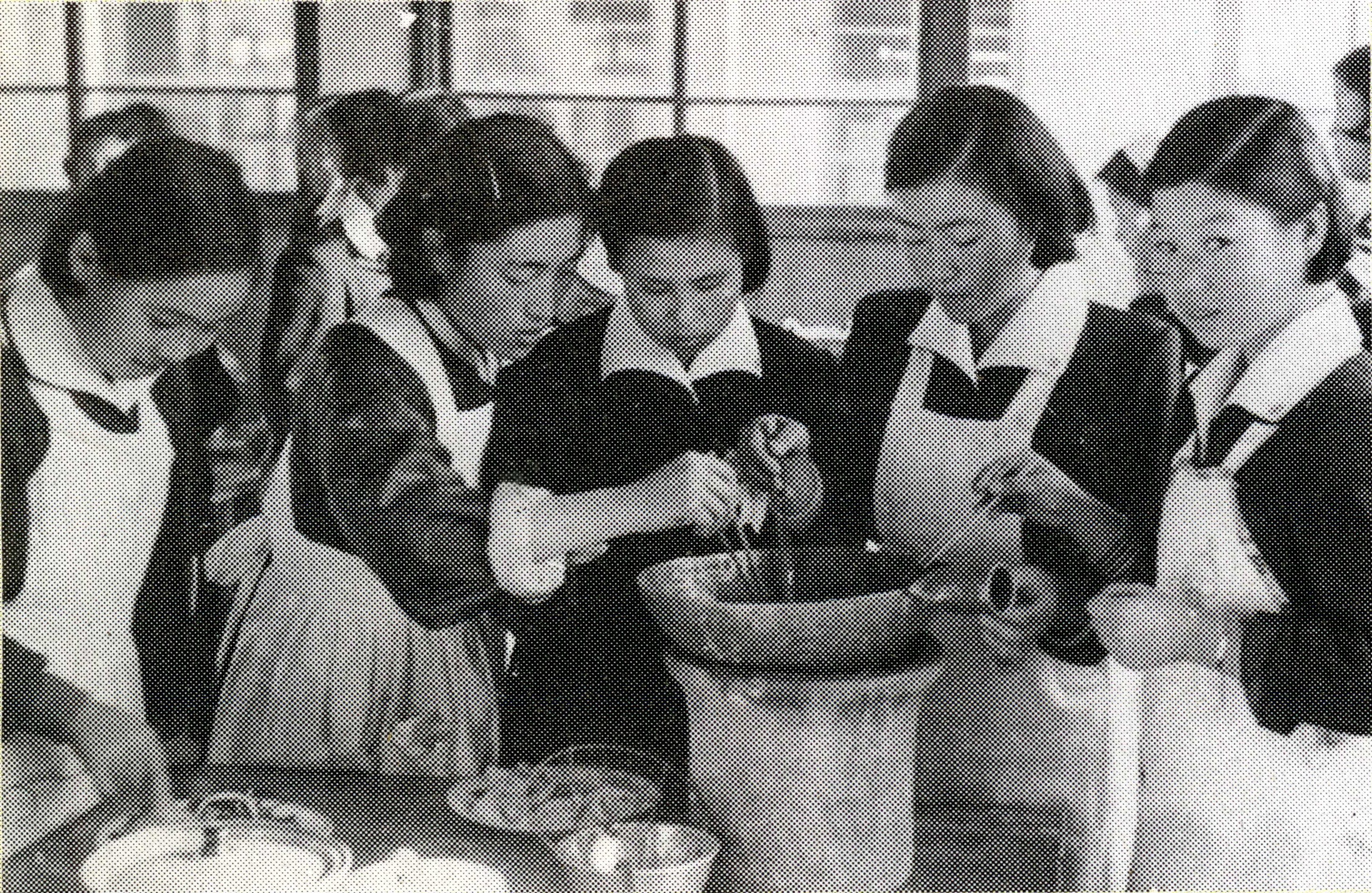1. Life
Hwang Hye-seong's life journey was marked by a deep commitment to learning and a passion for preserving Korea's culinary traditions, from her early education in Korea and Japan to her pivotal apprenticeship with the last Joseon court lady.
1.1. Childhood and Education
Hwang Hye-seong was born on July 5, 1920, in Cheonan, South Chungcheong Province, then part of Korea, Empire of Japan. She was the eldest daughter of a prominent Pyeonghae Hwang family, which owned extensive land, estimated at 5,000 seok (a traditional unit of land yield, indicating significant wealth). Following a traditional belief that having multiple foster mothers would prolong life, she had five such mothers, including a wet nurse, a carrying mother, a shaman mother, and a Buddhist monk from Gwangdeoksa as her "bald mother."
She began her formal education at Cheonan Ordinary School, where she initially struggled, failing her first semester. However, she persevered and ultimately graduated at the top of her class. After completing her second year at Gongju Public High School, her cousin, who was studying at Kyushu University in Japan, persuaded her family to allow her to study abroad. She subsequently moved to Fukuoka, Japan, where she graduated from Chukja Girls' High School (筑紫高等女学校Chikushi Kōtō JogakkōJapanese, now Chikushi Jogakuin Junior and Senior High School). Following this, she enrolled in the Department of Domestic Studies at Kyoto Women's Professional School (京都女子専門学校Kyōto Joshi Senmon GakkōJapanese, now Kyoto Women's University), where she specialized in Japanese cuisine and Western nutrition.


1.2. Early Career and Apprenticeship
Upon graduating in 1941, Hwang Hye-seong began her teaching career at Daedong Girls' High School (now Daejeon Girls' High School) as a home economics teacher. During her tenure, she also served as a second-year homeroom teacher, dormitory supervisor, and instructor for the cycling and gymnastics clubs. A notable incident occurred when the school principal spoke disparagingly of Korean volunteer soldiers, leading Hwang Hye-seong to comfort her Korean students and encourage them to strive for national independence and enlightenment, an act that caused her considerable trouble.
In 1940, she lost her maternal grandmother, followed by her father in 1941, and her mother in 1942. With the help of her paternal uncle, she moved to Donam-dong, Seoul, with her younger brother. In 1942, she was appointed assistant professor in the Department of Domestic Studies at Sookmyung Women's University (then Sookmyung Women's Professional School), where she taught nutritional science and Korean cuisine. Recognizing her limited knowledge of traditional Korean cooking, she was recommended by Oda Shogo, a consultant to the Yi Royal Household, to seek out Han Hui-sun. Han Hui-sun was the last kitchen court lady of the Joseon Dynasty, residing at Nakseonjae in Changdeokgung Palace. Hwang Hye-seong became her dedicated apprentice, learning the intricacies of Korean royal court cuisine for 30 years.
In January 1944, she married Han Byeong-deok, an employee at Hwashin Department Store, at Joseon Shrine. They had five children: eldest son Han Mun-gyu (born 1945), eldest daughter Han Bok-ryeo (born 1947), second daughter Han Bok-sun (born 1949), third daughter Han Bok-jin (born 1952), and second son Han Yong-gyu (born 1957). During the Korean War and the January 4th Retreat, Sookmyung Women's University evacuated to Busan, leading Hwang Hye-seong to resign from her professorship there. She then took up a position as an instructor at Yeongdeungpo Girls' High School. Subsequently, she taught at Myongji University before becoming a professor in the Home Economics Department at Hanyang University, which was conveniently located near Han Hui-sun's residence in Wangsimni.

2. Major Activities and Achievements
Hwang Hye-seong made profound contributions to Korean royal court cuisine through her extensive academic career and unwavering efforts in its preservation and popularization.
2.1. Academic Activities
Throughout her career, Hwang Hye-seong held professorships at several prestigious institutions, including Sookmyung Women's University, Hanyang University, and Myongji University. From 1973 to 1986, she served as the Dean of the School of Home Economics at Sungkyunkwan University. Her academic work focused on solidifying the scholarly understanding and dissemination of Korean royal court cuisine, ensuring its study within formal educational settings.
2.2. Preservation and Transmission of Royal Court Cuisine
Hwang Hye-seong's most significant contributions lie in her dedicated efforts to safeguard, systematize, and popularize Korean royal court cuisine, ensuring its continuity and accessibility for future generations.
2.2.1. Cultural Property Designation and Systematization
Hwang Hye-seong played an instrumental role in the recognition of Korean royal court cuisine as an Important Intangible Cultural Property. As a Technical Expert of Cultural Properties in the Office of Cultural Properties from 1962 to 1978, she, with the support of Professor Seok Ju-seon of Dankook University, tirelessly advocated for its designation. Her efforts culminated in the decision in December 1969 to register Joseon Royal Court Cuisine as National Intangible Cultural Property No. 38, effective from 1970.
Following the January 4th Retreat during the Korean War, many royal court recipes were lost. Hwang Hye-seong dedicated herself to restoring these recipes, meticulously recalling them and unearthing historical records such as `Eumsik Balgi` (food records) and `Jinyeon Uigwe` (royal banquet protocols) from the Gyujanggak archives. Collaborating with her teacher, Han Hui-sun, and her student Lee Hye-kyung, she systematically quantified ingredients and organized cooking methods, leading to the publication of `Ijogungjeongyoritonggo` (이조궁정요리통고Ijo Gungjeong Yori TonggoKorean; 李朝宮廷料理通考Ijo Gungjeong Yori TonggoKorean, "Comprehensive Study of Joseon Royal Court Cuisine") in 1957.
In 1971, she founded the Institute of Korean Royal Cuisine in Gahoe-dong, Jongno District, Seoul. This institution became a vital center for the practical transmission and propagation of royal court cuisine. When Han Hui-sun, the skill holder for Joseon Royal Court Cuisine, passed away in 1972 due to old age, Hwang Hye-seong was persuaded by Seok Ju-seon to succeed her. The following year, in 1973, Hwang Hye-seong was officially designated as the second skill holder (기능보유자Gineung BoyujaKorean) of Important Intangible Cultural Property No. 38.
2.2.2. International Activities and Popularization
Hwang Hye-seong actively worked to introduce Korean royal court cuisine to a global audience. She organized and conducted numerous exhibitions and courses in various countries, including the United States, Japan, France, the Philippines, and Taiwan. Domestically, she became a familiar figure to many South Koreans through her efforts to popularize royal court cuisine via mass media, making this once exclusive culinary tradition more accessible to the general public.
3. Publications and Research
Hwang Hye-seong authored numerous influential works that documented and analyzed Korean royal court and traditional cuisine. Her publications include:
- Ijogungjeongyoritonggo (이조궁정요리통고Ijo Gungjeong Yori TonggoKorean; 李朝宮廷料理通考Ijo Gungjeong Yori TonggoKorean) (joint work with Han Hui-sun, 1957)
- Encyclopedias of Korean Traditional Cuisine (1976)
- Cuisine of Korea (한국의 요리Hanguk-ui YoriKorean; 韓國의 料理Hanguk-ui YoriKorean) (1982)
- Korean Food (한국음식Hanguk EumsikKorean) (1985)
- Taste of Tradition (전통의 맛Jeontong-ui MatKorean) (1985)
- Korean Food Life (한국의 식Hanguk-ui SikKorean; 韓國의 食Hanguk-ui SikKorean) (1987)
- Traditional Korean Food (한국의 전통 음식Hanguk-ui Jeontong EumsikKorean) (1989)
- Joseon Royal Court Cuisine (조선왕조 궁중 음식Joseon Wangjo Gungjung EumsikKorean) (1993)
- Overall View of Korean Cuisine - 6th Food Life of the Court (1997)
- Our Cuisine 100 (1998)
- Royal Court Cuisine (궁중음식Gungjung EumsikKorean)
- Esthetics of Korea (한국의 미각Hanguk-ui MigakKorean; 韓國의 味覺Hanguk-ui MigakKorean)
- The Time I Prepared 12 Dishes of Surasang (열두첩 수라상으로 차린 세월Yeolducheop Surasang-euro Charin SewolKorean)
- A Review Study of the Royal Banquet Menu on the 24th of King Kojong in Chosun Dynasty (고종24년 진찬의궤 찬물에 대한 분석적 연구Gojong 24nyeon Jinchan Uigwe Chanmul-e Daehan Bunseokjeok YeonguKorean)
4. Family
Hwang Hye-seong had two sons and three daughters, all of whom pursued careers related to Korean royal court cuisine and food culture. Her eldest daughter, Han Bok-ryeo, became the director of the Institute of Korean Royal Cuisine and was designated as the third-generation skill holder of Joseon Royal Court Cuisine. Her second daughter, Han Bok-sun, manages the Han Bok-sun Food Culture Laboratory. Her third daughter, Han Bok-jin, serves as the Dean of the College of Culture and Tourism at Jeonju University.
5. Awards and Honors
Hwang Hye-seong received numerous accolades for her lifelong dedication and significant contributions to the preservation and modernization of Korean royal court cuisine:
- Designated as the second skill holder of National Intangible Cultural Property No. 38, Joseon Royal Court Cuisine (1973).
- Awarded the Order of Civil Merit (Mugunghwa Jang, 목련장MoknyeonjangKorean) (1985).
- Awarded the Order of Cultural Merit (Bogwanjang, 보관장BogwanjangKorean) (1990).
- Designated as an Honorary Possessor of Joseon Royal Court Cuisine (August 2006).
6. Death
Hwang Hye-seong passed away from old age at 12:30 PM on December 14, 2006, at the Seoul Medical Center in Seoul. She was 86 years old.
7. Legacy and Impact
Hwang Hye-seong's work profoundly influenced the preservation and modernization of Korean royal court cuisine, shaping Korean cultural identity. Her systematic research, academic contributions, and dedicated efforts in transmitting this culinary heritage ensured its survival and accessibility. By documenting and popularizing royal recipes, she transformed a once exclusive tradition into a source of national pride and a subject of academic study. Her legacy continues through the institutions she founded and the work of her descendants, who carry on her mission to promote Korean food culture.
7.1. Commemoration of 100th Anniversary
On July 5, 2020, the 100th anniversary of Hwang Hye-seong's birth was commemorated by Google with a Google Doodle dedicated to her. In further tribute to her enduring legacy, the Institute of Korean Royal Cuisine, which she founded, launched a special online exhibition celebrating Hwang Hye-seong on Google Arts & Culture.